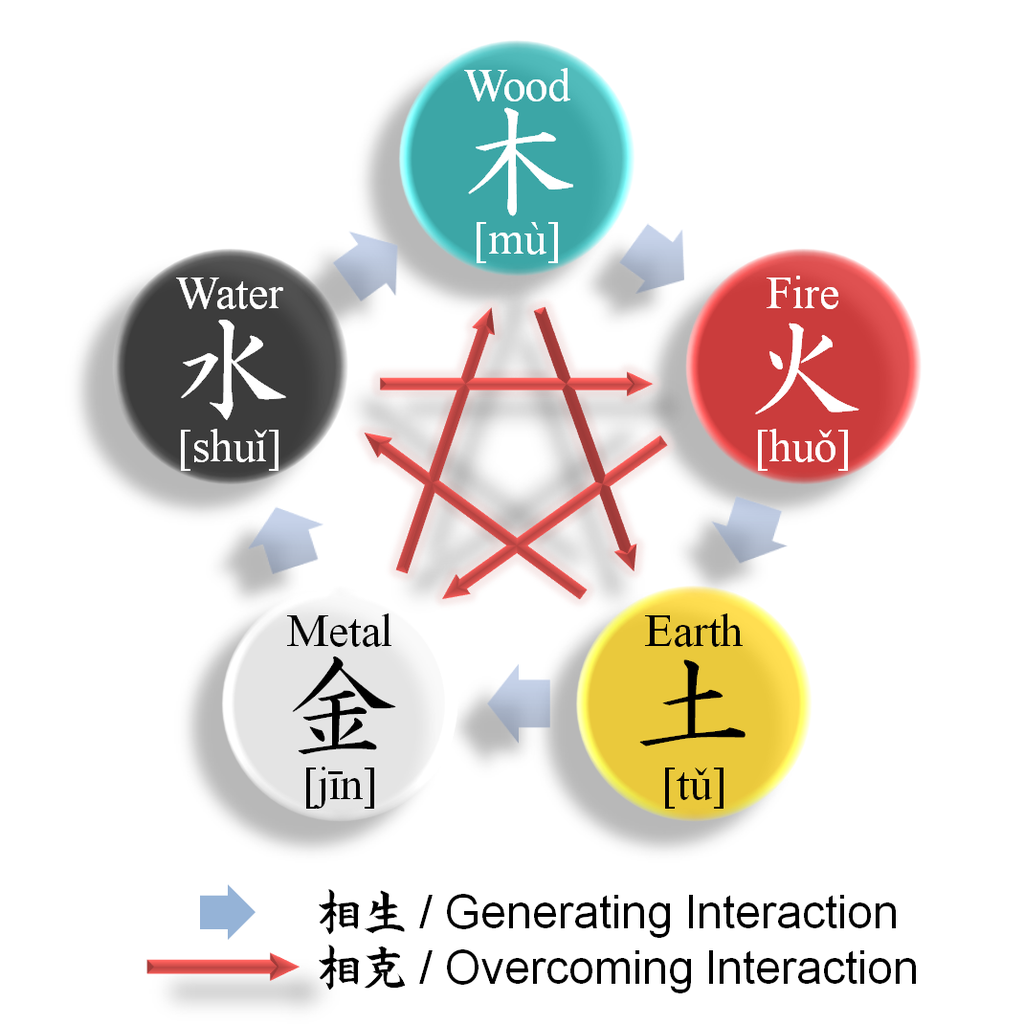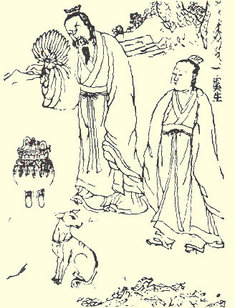Chinese alchemy is the first documented, but they always had their own version of alchemy. I don't understand it well (yet), but alchemy in China seems to be ingrained deeply into Daoist philosophies (body/spirit relationship) and medicine.
The four elements of Empedocles, plus the ether of Aristotle, are similar to the five elements of Wuxing, the five elements of change: water, wood, fire, earth, and metal. The five elements were present in Chinese philosophy perhaps as early as 800 B.C. as influencing each other but not transmuting. These five elements are so deep in Buddhist beliefs that when the Tibetans invented prayer flags, they used five colors to represent the five elements. And as in Aristotelian influences, these five elements were infused into most aspects of Chinese society and medicine; balancing and aligning the environment using these five elements is the heart of Feng Shui.

There is a possibility that the four-element theory of Empedocles was influenced by the Chinese five-element wuxing, but in ancient Greece the fifth element, æther, was not added until after 300 B.C. There is no evidence of elemental transmutation in wuxing until after 200 B.C., so to me it appears that Greek ideas influenced Chinese alchemy more than the reverse.
Of wuxing, an early 1900's Chinese historian says:
The seasons of the year were thus divided among the wu-hsing: spring, wood; summer, fire; autumn, gold; winter, water, and, in order to complete the story, they even went so far as to assign the interim between summer and autumn to earth. In a similar manner the magic quintet was correlated with the five locations east, west, north, south, and center; with the five colors: blue, red, yellow, white, and black; with the five tones kung, shang, ko, cheng, and yii; with the five tastes: sour, bitter, salty, astringent, and sweet; with the five animated species: furred, shelled, scaly, feathered, and nude; with the five worships: of wells, of furnaces, of doors, of eaves, and of sacred roadways; with the five grains; with the five domesticated animals: horse, ox, sheep, dog, and hog; with the five internal organs of the body: heart, liver, lungs, spleen, and kidneys; with the five rulers of ancient China...; and with the five gods.... Thus the thousand and one entities of the universe have been ruthlessly forced into five categories corresponding to the wu-hsing. This fantastic mood has been dominating the mind of the nation for at least two thousand years and more, and has often manifested itself in deeds.
CH'I-CH'Ao LIANG, On the Origin and Evolution of the Doctrines of Yin- Yang and Wu-hsing (in Chinese), Eastern Miscellany, Shanghai, Vol. 20, No. 10, pp. 70-79, 1923.
Here is the story of one early alchemist, Wei Po-Yang (142 AD), who
entered the mountains to make efficacious medicines. With him were three disciples, two of whom he thought were lacking in complete faith. When the medicine was made, he tested them. He said, 'The gold medicine is made but it ought first to be tested on the dog. If no harm comes to the dog, we may then take it ourselves; but if the dog dies of it, we ought not to take it.' (Now PO-YANG had brought a white dog along with him to the mountain. If the number of the treatments of the medicine had not been sufficient or if harmonious compounding had not reached the required standard, it would contain a little poison and would cause temporary death.) PO-YANG fed the medicine to the dog, and the dog died an instantaneous death. Whereupon he said, ' The medicine is not yet done. The dog has died of it. Doesn't this show that the divine light has not been attained? If we take it ourselves, I am afraid we shall go the same way as the dog. What is to be done ? ' The disciples asked, ' Would you take it yourself, Sir? ' To this PO-YANG replied, ' I have abandoned the worldly route and forsaken my home to come here. I should be ashamed to return if I could not attain the hsien (immortal). So, to live without taking the medicine would be just the same as to die of the medicine. I must take it.' With these final words he put the medicine into his mouth and died instantly. On seeing this, one of the disciples said,' Our teacher was no common person. He took the medicine and died of it. He must have done that with especial intention.' The disciple also took the medicine and died. Then the other two disciples said to one another,' The purpose of making medicine is to attempt at attaining longevity. Now the taking of this medicine has caused deaths. It would be better not to take the medicine and so be able to live a few decades longer.' They left the mountain together without taking the rnedicine, intending to get burial supplies for their teacher and their fellow disciple. After the departure of the two disciples, PO-YANG revived. He placed some of the well-concocted medicine in the mouth of the disciple and in the mouth of the dog. In a few moments they both revived. He took the disciple, whose name was Yu, and the dog, and went the way of the immortals. By a wood-cutter whom they met, he sent a letter of thanks to the two disciples. The two disciples were filled with regret when they read the letter.
Lieh Hsien Ch'iian chuan

Wei Po-Yang, Yu, and the dog.
The Daoist medicinal alchemy, neidan, has as its goal the attainment of immortality. This is not an elixer of life that the alchemist drinks, but a lifestyle.
Here is a paper published in Ambix which contains a translation of the first-known text exclusively talking about alchemy in China:
Ts'an T'ung Ch'i.pdf (2.49 mb)
Here is a description of the life of one having taken the Elixir of Life, or Medicine:
Chapter XXIII.
Wise men, understanding this principle, know clearly what course to follow; They practise with diligence day and night. Having eaten [the medicine] for three years, a man attains buoyancy of movement and is able to travel great distances. Stepping over a fire, he is not scorched; dipped into water, he does not get wet. He is able to appear and to disappear [at will]. He will be happy forever. Having achieved the Tao Te, he hides himself to await his time. In time, T'ai- (the Supreme One) will give the order for him to remove his residence to Chung-chou (Central Isle). Thence, upon fulfilment of the required deeds, he will be raised on high and duly ordained.